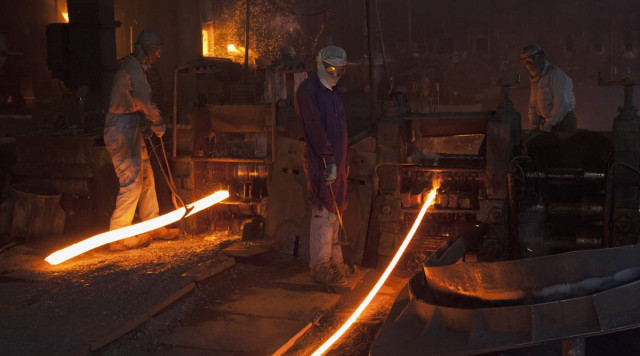Steel sector braces for shortage of raw material
PALSP says only 30% mills operating as scrap prices paralyse industry

Pakistan’s long steel sector is bracing itself for a potential shortage of raw material in anticipation of steel scrap prices hitting a record high. A move that poses a significant threat to the industry’s operations and profitability.
With Letters of Credit (LCs) not being opened, domestic scrap shortage is compounding and is hitting manufacturers drastically, said Syed Wajid Bukhari, Secretary General of the Pakistan Association of Large Steel Producers (PALSP) in a statement.
“The crisis-hit steel industry is facing an acute shortage of raw material scrap, with the situation going from bad to worse every day. The local price of scrap has jumped from Rs120,000 to Rs200,000 per tonne in just three weeks, forcing many mills to shut down. Only 30% of the mills are operating and that too at very low utilisation rates,” lamented Wajid, adding that, “Record scrap prices threaten to paralyse the steel industry.”
JS Global Steel Sector Analyst Waqas Ghani Kukaswadia attributed the long steel sector’s crisis to the sharp depreciation of the rupee against the dollar, rising inflation and impediments on the import of raw material due to LC restrictions. “In addition, the price of steel scrap, that accounts for over 60% of a rebar manufacturer’s cost, has also increased by around 27% from its most recent low of $339 per tonne in November 2022,” said Kukaswadia, adding that, “In an effort to pass on the rising costs, steel rebar producers have been raising prices by roughly Rs85,000 per tonne, up 38% since the beginning of the year.”
Apart from the delayed production caused by the scarcity of imported raw material, he said, “Some steel companies have also suffered losses on account of demurrages paid for containers withheld at ports.”
“Rebar manufacturers are being held hostage by domestic scrap dealers or Kabaris. Along with domestic scrap prices, rebar prices are likely to cross over Rs325,000 per tonne,” said the PALSP secretary general.
“Kabaris are dominating the market and holding mills hostage with their pricing,” said Bukhari, adding that, “The shortage is particularly acute in the case of scrap imports, a critical component for the steel industry.”
In the second quarter of the current fiscal year, scrap imports stood at 616,000 metric tonnes, a decline of 50% from the same period last year when 1,235,000 metric tonnes were imported; the largest drop in scrap imports in the last two decades.
Industry experts have warned that the crisis will have a far-reaching impact, with 42 allied industries expected to be adversely impacted and 7.5 million jobs at risk.
“The steel industry is the backbone of the economy, and if we do not take action now, the consequences will be dire,” warned Bukhari.
Published in The Express Tribune, March 8th, 2023.
Like Business on Facebook, follow @TribuneBiz on Twitter to stay informed and join in the conversation.



















COMMENTS
Comments are moderated and generally will be posted if they are on-topic and not abusive.
For more information, please see our Comments FAQ